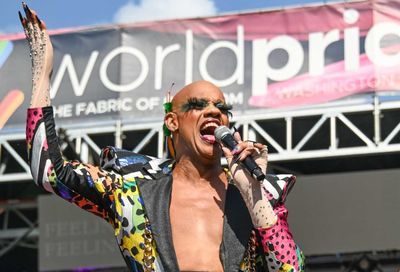Taking on the Toxic Masculinity of Jack the Ripper
We Happy Few's 'Kill The Ripper' is a feminist revenge fantasy that takes down toxic male serial killers.

“We’re all still waiting for the dust to settle,” Megan Behm says. Having survived the pandemic, theater professionals and companies today are continuing to face down “concerns about budgeting and space and all sorts of issues. [The landscape] still feels very, very…tenuous,” continues Behm, who works in the marketing department at Round House Theatre by day and as a director for hire by various companies by night.
The issues run deep. “There are fewer technicians in town,” Behm says. “There are fewer resources. Rental prices have gotten higher. There are a lot of ingredients that go into making good theater, and a lot of what we’ve been able to rely on in the past just isn’t there. A lot of folks during COVID shifted — they moved to other industries, and not everyone came back.”
As one specific example, Behm cites the extra steps and costs involved in procuring special effect makeup for the production of Kill The Ripper she’s directing for We Happy Few at the Capitol Hill Arts Workshop. “There’s nowhere in town to buy [that] anymore. You used to be able to go to a place in Takoma Park, and it’s gone now. We had to special order stuff from California.”
On the flip side, she adds, “it has meant that people have had to get more creative, and there’s something to be said for that.” In that regard, it’s hard to imagine a more creative team for the theater than the one Behm has headed up for Kill The Ripper.
“I haven’t seen a lot of shows like it in D.C.,” Behm says of Fairlith Harvey’s play. “It’s just a little different. It’s funny, it’s smart, it’s unexpected, it’s unapologetically feminist, it’s unapologetically pro-sex and pro-LGBTQ. It’s sort of Inglourious Basterds but with corsets. It’s not taking down Nazis, it’s taking down toxic male serial killers. But it does have that slightly Tarantino vibe, in a more women-centered way.”
Kill The Ripper is an imaginative work of historical fiction focusing on a gruesome spree of murders in London during the fall of 1888. The murders were attributed to the infamous Jack the Ripper, whose victims were all women. “He’s called the Ripper because he didn’t just kill them,” Behm says. “He also gutted them, for lack of a better word. He did very disgusting things to their bodies.

“The reason why there’s still so much conversation about him is that to this day, we really don’t know who he was,” she continues, noting it is one of history’s greatest unsolved mysteries.
More importantly, he got away with it. He was never caught or found.
“He just suddenly stopped,” Behm says. “And so there have been a lot of theories about what happened to this guy. Did he leave? Did he die? Did someone catch him?
“That’s part of where the fearless idea for this show came from. What if a bunch of women took him out? It’s revisionist history, but from my perspective, it’s not entirely implausible that a group of women — or a woman — who just didn’t want to die but also didn’t want to be caught, found a way to do away with him.”
Kill The Ripper centers on three main characters, all sex workers in Victorian London — a trade that the play, Behm says, “depicts as something that these women choose to do, and for many different reasons. So they have agency. They are not victims of their circumstance — they are choosing to make the best of a rotten situation, and they are choosing to do it on their own terms.”
As the play develops, a prominent LGBTQ theme emerges when, as Behm explains, “two characters fall in love. And it’s just presented as the natural evolution of their friendship and attraction to each other.” Actors Bri Houtman, Paige O’Malley, and Gabby Wolfe portray the three female characters, joined by Robert Pike, who plays Ripper in addition to a dozen other male characters.
“This show is for anyone who has ever been one instance of harassment away from just completely snapping — whether they’re a woman getting catcalled all the time or sexually harassed, or people who are harassed for their ethnicity, their sexual identity, their gender identity — anything. On some level, it’s a deep wish fulfillment for anyone who has ever really wanted to just tell off or hit the toxic person that’s been making their life unpleasant.”
Kill The Ripper runs Thursday through Saturday evenings through Nov. 18, at the Capitol Hill Arts Workshop, 545 7th St. SE. Tickets are $25 for general admission. Visit www.wehappyfewdc.org.
Support Metro Weekly’s Journalism
These are challenging times for news organizations. And yet it’s crucial we stay active and provide vital resources and information to both our local readers and the world. So won’t you please take a moment and consider supporting Metro Weekly with a membership? For as little as $5 a month, you can help ensure Metro Weekly magazine and MetroWeekly.com remain free, viable resources as we provide the best, most diverse, culturally-resonant LGBTQ coverage in both the D.C. region and around the world. Memberships come with exclusive perks and discounts, your own personal digital delivery of each week’s magazine (and an archive), access to our Member's Lounge when it launches this fall, and exclusive members-only items like Metro Weekly Membership Mugs and Tote Bags! Check out all our membership levels here and please join us today!

























You must be logged in to post a comment.